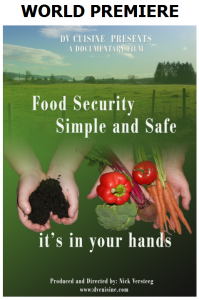 Last night, I went to the movies, to watch a new documentary about food security, the world premiere of Food Security Simple and Safe: it’s in your hands. Produced by Nick Versteeg, of DV Cuisine, the screening was part of the Victoria Film Festival. It was a packed house. I know why.
Last night, I went to the movies, to watch a new documentary about food security, the world premiere of Food Security Simple and Safe: it’s in your hands. Produced by Nick Versteeg, of DV Cuisine, the screening was part of the Victoria Film Festival. It was a packed house. I know why.
Not bothered yet with the price and accessibility of nutritious food? You probably will be, soon enough. Food security issues are impacting, if not precipitating, current global events. At the core of addressing food security issues, local and far away, is collaboration, people and organizations (and countries!) working together, to deal with systemic issues.
It’s in your hands
Nick Versteeg’s film touches the local and global. In addition to his extensive media background, Versteeg has recently taken up hobby farming on Vancouver Island. The film weaves together a year-in-the-life of his hobby farm experience, along with an organic farm/farmer in the Okanagan (BC Interior), and a small plot farm in Malawi, Africa. By intention, the story leaves as many questions as answers. Here’s the trailer for the film:
(can’t see it? click here to watch on YouTube or here to see it on DV Cuisine)
Why community collaboration?
Here are few of the local food security issues, touched on in the film, that are best addressed using good collaborative practices:
- Access to farm land: The high cost of land discourages land ownership, especially among new and/or young farmers. Land sharing, renting, leasing, and other co-operative, and other collaborative approaches to land-use, enable more people to farm, and/or participate in the farming community.
- Community support: Small-scale, sustainable, economically viable agriculture can be facilitated and supported by broad-based (collaborative) community partnerships, including local government; e.g., see my post about Haliburton Community Farm
- Diverse business models: How to deal with imbalances in the cost of production; e.g., grains cost more than veggies and fruits to produce? How to address natural resource scarcity issues; e.g., water? Expanding the palate of business and value-chain options available to farmers can only help… what collaborative business models can be developed in your locale?
- Resource sharing/exchange: The film provided an example; a livestock farm overflowing with manure/compost material and a nearby vegetable farmer in need of compost… yet nothing happens. How to transport the manure to the veggie farmer? Collaborative process can help overcome the transportation issues, and facilitate a win-win, mutual-benefit, arrangement between the two farmers
- Community of practice: 1 + 1 > 2 Working together, sharing ideas, knowledge, resources farmers and farmers, farmers and consumers… building communities to share knowledge and grow capacity is an exercise in collaboration… and the Internet an invaluable tool to assist
- Systems thinking: Why are bees not returning to the farmer’s beehives? How to integrate urban, peri-urban and rural farming production? How to maintain seeds diversity? (homage to Sharon Rempel) How to set up farmer training programs that include a sizeable business component? All of these needs challenges/needs demand are systemic in nature, and require appropriate collaborative, systemic responses… “it takes a system to change a system”
Building bridges between diverse interests groups, mediating win-win resolutions, and priming the pump for innovative action these are all outcomes of community collaboration and go hand-in-hand with food security! (the way I see it, anyways)
Farmers have much to teach us
Although I’m no farmer (discounting my modest home veggie garden does not qualify me), farming and food security has special meaning to me, and others too apparently. My post, The good farmer: An expert in relationships and sustainability (featuring Veta la Palma) has received more unique page views on this blog, than any other post, in my 2 years of blogging.
Setting the table for what’s next
I encourage you to contact Nick Versteeg, get a hold of his film, promote it, show it, and encourage wider distribution of the film. It’s what he wants you to do. It’s what you should do, in your community.
What say you about all this?

Speak Your Mind